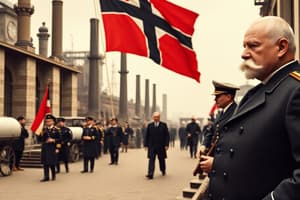Podcast
Questions and Answers
What was a significant outcome of the Austro-Prussian War of 1866?
What was a significant outcome of the Austro-Prussian War of 1866?
- Holstein was annexed by Prussia (correct)
- Prussia was excluded from German affairs
- The formation of the Italian Kingdom
- Austria regained control of Holstein
Which states entered the Franco-Prussian War on the side of Prussia?
Which states entered the Franco-Prussian War on the side of Prussia?
- Southern German states only
- All German states
- Northern German states only
- Bavaria, Wurtemberg, Baden, and Hesse Darmstadt (correct)
What strategy did Bismarck use to provoke France into declaring war on Prussia?
What strategy did Bismarck use to provoke France into declaring war on Prussia?
- Sending troops to the French border
- Signing a treaty with Britain
- Publishing the Ems Telegram (correct)
- Issuing a public declaration of war
What was one of the goals of the Danish War in 1864?
What was one of the goals of the Danish War in 1864?
Which territory was granted to Austria after the Danish War?
Which territory was granted to Austria after the Danish War?
What was the primary conflict of the Seven Weeks War?
What was the primary conflict of the Seven Weeks War?
What was the resulting political structure after the formation of the North German Confederation?
What was the resulting political structure after the formation of the North German Confederation?
What was one significant event that occurred on September 2, 1870, during the Franco-Prussian War?
What was one significant event that occurred on September 2, 1870, during the Franco-Prussian War?
What was the primary aim of the Treaty of Vienna in 1815?
What was the primary aim of the Treaty of Vienna in 1815?
Which of the following best describes nationalism as a concept?
Which of the following best describes nationalism as a concept?
What was a significant obstacle to Italian unity in 1815?
What was a significant obstacle to Italian unity in 1815?
Following the Congress of Vienna, Italy was characterized as being:
Following the Congress of Vienna, Italy was characterized as being:
Which of the following statements about the revolutionaries during the time of the Treaty of Vienna is correct?
Which of the following statements about the revolutionaries during the time of the Treaty of Vienna is correct?
How did the Treaty of Vienna affect the political landscape of Europe?
How did the Treaty of Vienna affect the political landscape of Europe?
What role did Austria play in the fragmentation of Italy?
What role did Austria play in the fragmentation of Italy?
What was a likely impact of the nationalist movements in Europe during this period?
What was a likely impact of the nationalist movements in Europe during this period?
What was the significant outcome of the Treaty of Frankfurt signed in 1871?
What was the significant outcome of the Treaty of Frankfurt signed in 1871?
Which policy did Otto Von Bismarck implement to achieve German unification?
Which policy did Otto Von Bismarck implement to achieve German unification?
Which rivals competed for dominance in a united Germany?
Which rivals competed for dominance in a united Germany?
What was proclaimed at Versailles in 1871?
What was proclaimed at Versailles in 1871?
What major war did Prussia fight to support its aspirations for German unification?
What major war did Prussia fight to support its aspirations for German unification?
Who was proclaimed as the German Emperor (Kaiser) at the establishment of the German Empire?
Who was proclaimed as the German Emperor (Kaiser) at the establishment of the German Empire?
What were the primary resources associated with Alsace and Lorraine that made them significant?
What were the primary resources associated with Alsace and Lorraine that made them significant?
What was one of the consequences of the defeat of the French Second Empire?
What was one of the consequences of the defeat of the French Second Empire?
Flashcards are hidden until you start studying
Study Notes
End of the French Second Empire
- The defeat in the Franco-Prussian War led to the collapse of the French Second Empire.
- The German Empire was proclaimed at Versailles, symbolizing Bismarck's success in unifying Germany.
Treaty of Frankfurt (May 10, 1871)
- France ceded Alsace and Lorraine to Germany, rich in coal and iron.
- France agreed to pay large war indemnities to Germany.
Important Figures
- King William of Prussia became the German Emperor (Kaiser) after the empire's proclamation in 1871.
Otto von Bismarck's Strategies
- Utilized the "Blood and Iron" policy, emphasizing military strength for unification.
- Main rivals for dominance in a united Germany were Austria and Prussia.
Major Wars in German Unification
-
Danish War (1864): Fought over Schleswig and Holstein; resulted in Prussia acquiring Schleswig and Austria retaining Holstein.
-
Austro-Prussian War (Seven Weeks War, 1866):
- Fought primarily for leadership of Germany.
- Prussia, with support from Italy, defeated Austria at the Battle of Königgrätz.
- Outcomes: Holstein annexed to Prussia, Austria excluded from German affairs, Venetia given to Italy, and establishment of the North German Confederation.
-
Franco-Prussian War (1870-71):
- Initiated by Bismarck through the Ems Telegram, provoking France into war.
- Southern German states supported Prussia against France.
- French forces defeated at the Battle of Sedan on September 2, 1870.
Treaty of Vienna (1815)
- Established by Britain, Russia, Prussia, and Austria to revert Napoleonic changes and restore monarchies.
- Nationalism grew in response to conservative efforts from the Treaty.
Nationalism in Europe
- Identified as a significant force post-Congress of Vienna leading to various movements across Europe.
- Developed characteristics include a sense of shared culture, language, and history among groups desiring self-determination.
Italian Unification Context
- Italy remained fragmented post-Congress of Vienna, facing Austrian occupation in Lombardy and Venice.
- Discussions on the unification process highlight historical struggles for national coherence and identity.
Learning Outcomes
- Understanding the complexities behind the causes, processes, and consequences of both the American Civil War and European nationalism movements, specifically relating to the unification of Germany and Italy.
Studying That Suits You
Use AI to generate personalized quizzes and flashcards to suit your learning preferences.




